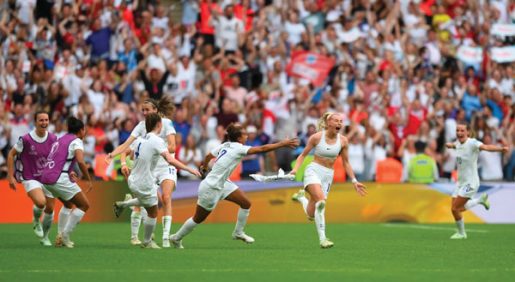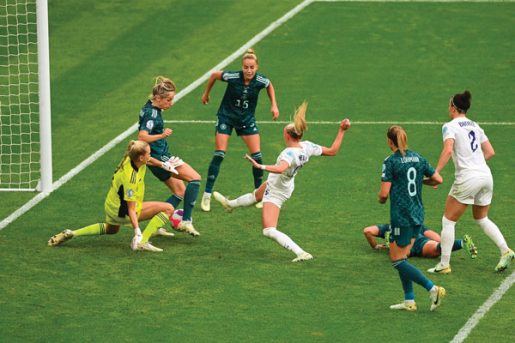England Crowned Champions of Europe:
It’s Finally Home and It was the Lionesses
By Danial Golforoush
Deep in extra time and with penalty shootouts less than 10 minutes away, an unlikely hero—Chloe Kelly—arose. After a corner kick sent in by Lauren Hemp that deflected off a flying Lucy Bronze, Kelly bodied her marker out of the way, only for her first attempt to be unsuccessfully blocked by the German goalkeeper, Merle Frohms. But the bouncing ball was then toed in past Frohms by Kelly!

The 24-year-old Manchester City forward celebrated by running towards the fans and ripping off her jersey—a move that has had almost every fan, pundit, and analyst, like myself, comparing it to the iconic image of the American forward Brandi Chastain removing hers in the 1999 Women’s World Cup final after scoring the match-winning penalty kick. That iconic celebration made rounds at the time, kicking off a revolution of sorts for women’s football in the States. Many hope Kelly’s celebration carries a similar, if not bigger, impact!
The Women’s Euro 2022 final was played in the iconic Wembley Stadium in London, with the Germans taking on the English on their own home turf. Both teams advanced through the group stages by winning all 3 of their respective matches without conceding a goal; with the Germans actually not conceding any goal by their opponents (only 1 own-goal) until the finals! The final saw a record-breaking attendance of 87,192 fans, beating the previous record of 80,203 set in the 2012 Olympics Finals for a women’s international match in England.
With both teams naming their strongest starting eleven (XI), it was a guarantee that the match would be a tug of war. And with the possession of the ball split between the two teams pretty equally (with England having 1% more of the ball), it proved as much! 
England: Mary Earps, Rachel Daly, Leah Williamson (C), Millie Bright, Lucy Bronze, Keira Walsh, Georgia Stanway, Lauren Hemp, Fran Kirby, Beth Mead, Ellen White
Germany: Merle Frohms, Kathrin-Julia Hendrich, Marina Hegering, Felicitas Rauch, Lina Magull, Giulia Gwinn, Lena Oberdorf, Sara Dabritz, Svenja Huth (C), Jule Brand, Lea Schuller
Even though arguably the strongest XI was set to play for both teams, it was the substitutes who made the difference for England. The burst of energy injected into the game by bringing on Alessia Russo and Ella Toone paid off right away, with Manchester United’s forward Toone opening their account only 6 minutes after being brought on with a beautiful chip (subbed in for the veteran Fran Kirby 56’). But Germany responded within 17 minutes, with less than 11 minutes to go until the 90th minute. Within that 17 minutes, the Germans really tested the English as they had throughout the game and the English continued to sit deeper and deeper. It was finally Lina Magull who converted a pass from Tabea Wasmuth, who missed a one-on-one in the second half just one minute after being subbed on. The movement from the right flank left Millie Bright alone as her defensive partner Leah Williamson had left her post empty to chase for Wasmuth.
With the game going to extra time and with little to none being offered by both teams, the penalty shootout was expected. With the English’s “curse” with penalty shootouts (for both the Lions and Lionesses), it was definitely not a welcomed prospective end to the match. But Kelly had different ideas and the Lionesses brought football officially home after 20,455 days.
Yes….you read that right.
By defeating the eight-time champions Germany, the Lionesses not only won their first major trophy, but they won England’s first since 1966. 
England’s win was personal since they needed to prove they have become one of the best teams in the world. It was only 13 years ago that they had lost 6-2 against Germany and they needed to show that the gap is no longer as wide as it was before. Both teams are filled with superstars of the game, with many playing for the biggest clubs in the world, but it just seemed like the English wanted it more. They needed it more. There was a sense of passion and youth in their play. They were not here to build for the future, they were here for now and now only—a feeling best embodied by their young, yet experienced and solid captain, the 25-year-old Arsenal central defender, Leah Williamson.
England ended with not only the trophy but The Golden Boot Winner and The Player of the Tournament in Arsenal’s forward Beth Mead, who scored 6 goals, tying Germany’s Alexandra Popp. Popp received The Silver Boot as she provided fewer assists than Mead throughout the games. Germany did not go home empty-handed, though, as their starlet Lena Oberdorf was named The Young Player of the Tournament.
Once upon a time the “allure” and “desire” for a competitive women’s game was questioned and doubted, but that is no longer the case with the game growing with every match, every tournament, and every season. Suzanne Wrack of The Guardian, who experienced the atmosphere firsthand, reported that: “[t]he public impact of the tournament was exemplified by tube trains heading to northwest London littered with England shirts from before midday. Hours before kick-off Wembley Way was flooded with fans. Amid the carnival-like vibes were whispers of nerves and heightened emotions from those deeply invested in the development of the women’s game – including the families of some of the players who had ducked out of the ground to soak up the atmosphere.”
It is almost surreal that it was the women’s team of the footballing nation of England who brought home the big trophy—to a nation with one of the best men’s leagues, the legendary so-called “Golden Generation” in the early 2000s, and the highest paid men’s players who have not won a major trophy since 1966. This is a direct testament to the fruits of investment in the game as a whole without the sexism that the game has suffered from for so long. Imagine the heights that the game and its positive influence can reach if both the women’s and men’s teams were treated and invested in equally.
1- https://www.theguardian.com/football/2022/jul/31/england-germany-womens-euro-2022-final-match-report


















